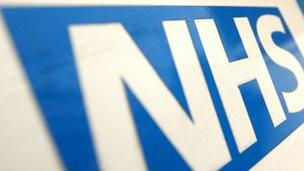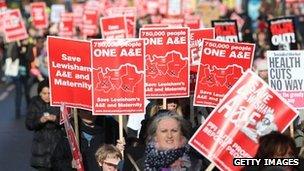Closing NHS services: the impossible job?
- Published
- comments

The medical profession has argued expert care needs to be done at fewer sites
The verdict over child heart surgery in Leeds is just the latest twist in a long-running fight over the future of this complex area of care.
The debate has been raging for over a decade and has already been subject to legal challenges - a perfect illustration of why changing the NHS remains an incredibly difficult task.
The medical profession is united in the belief that expert care needs to be offered at fewer sites.
Child heart surgery is the prime example of that. It is one of the most complex procedures undertaken by the NHS with just 3,600 operations carried out each year.
To provide a uniformly high quality and safe service operations in such fields must be concentrated at specialist sites, it has been argued. Evidence shows this helps doctors improve skills and share expertise.
But the push for change is not just confined to child heart surgery. Similar debates are going on over everything from A&E units to stroke care.
The problem is reorganisations come at a price: the loss of services from much-loved local hospitals.
The strength of feeling displayed in Leeds - mirrored in south London, where campaigners took to the streets a month ago to oppose the downgrading of Lewisham Hospital's A&E unit - is testament to that.
These are difficult decisions and, with money getting ever tighter in the health service, expect more disputes in the future.
Re-think
So where does the NHS go from here?
In terms of child heart surgery the verdict could be appealed by the Joint Committee of Primary Care Trusts, which has coordinated the review.
This happened when London's Royal Brompton Hospital won a legal challenge two years ago. The Court of Appeal subsequently overturned the verdict.

The decision to downgrade Lewisham's A&E unit prompted outrage
As for the wider issue, some believe there needs to be a complete recalibration in how we view hospitals.
One of the biggest advocates for this is the NHS Confederation, which represents health managers.
By coincidence it has published a report on Thursday calling for a re-think in how services are organised.
It suggested large hospitals should be reserved for those with life-threatening conditions or needing complex care instead of being a dumping ground for the sick and frail.
Jo Webber, from the NHS Confederation, said: "Changing how we think and respond to circumstances is never easy, but never before has the scale of change required been like that currently facing the health and social care system.
"For too long, the default setting when we think about health care or support is to think of a hospital. But in reality, acute hospitals - whether major teaching sites or local district generals - are rarely the best place for someone who needs ongoing health or treatment."
This, of course, would require a big investment in community services first.
And perhaps that is the key. One of the most successful reorganisations of recent years was to London's stroke services.
Traditionally, care was provided from 30 hospitals, but after changes in 2010 emergency care is now provided in eight specialist centres.
Instead of simply shutting the other 22 bosses in London made sure they invested in rehabilitation services - some at the existing hospitals, some at new facilities - close to people's homes so that the public knew there would still be services available locally.
The changes were introduced with limited resistance. Some would argue that such change is easier to achieve in the capital where distances between sites is shorter - and that maybe true.
But the idea of good communication and investing in community-based services early are principles many would agree could help wherever changes is taking place.